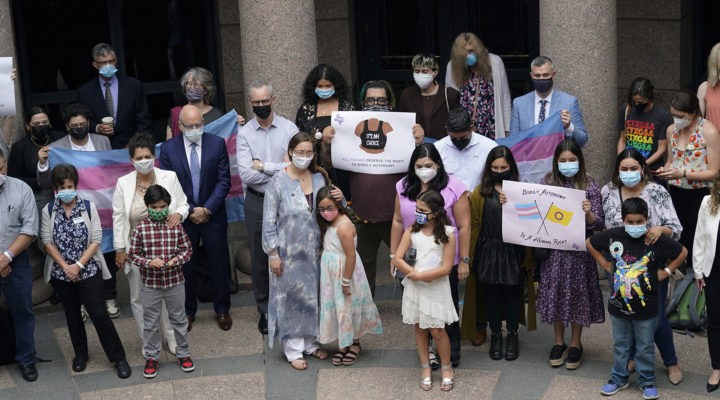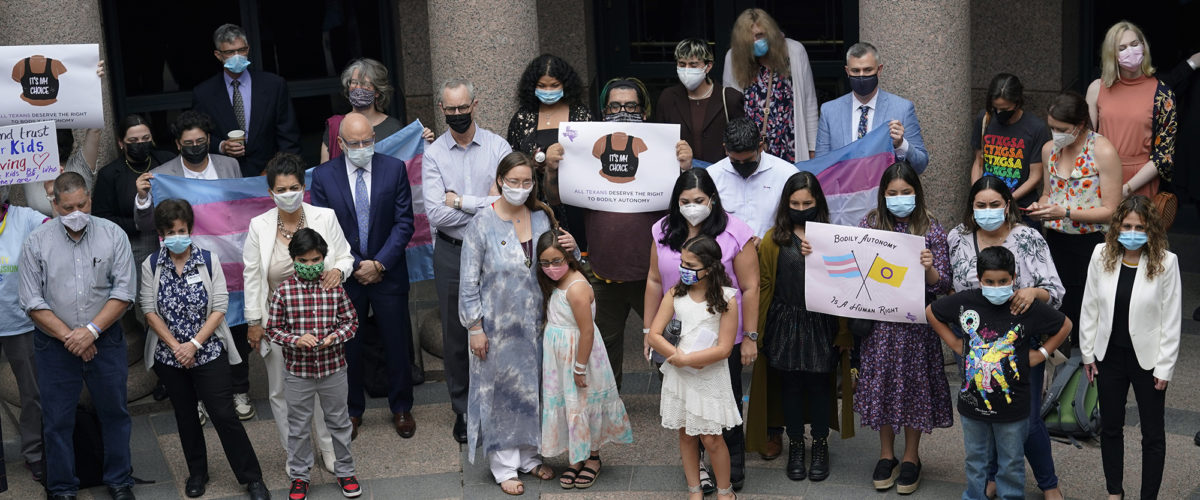A Baptist deacon is the author of an anti-transgender bill that has passed the Texas Senate and now awaits action in the House — a bill that has been called by critics one of the cruelest in a season of anti-trans bills sweeping state legislatures this year.
Texas Senate Bill 1646 seeks to redefine “child abuse” to include medical treatment of transgender children and youth. This bill would place medical treatment under the care of a licensed physician in the same category as raping, trafficking or making pornography with a child.

Charles Perry
The bill’s author is Lubbock Republican Charles Perry, whose personal website identifies him as a deacon at Southcrest Baptist Church in Lubbock. Southcrest is affiliated with the Southern Baptist Convention and the Southern Baptists of Texas Convention. He also is the author of another bill, S.B. 29, that would prevent transgender female athletes, born male but who now identify as female, from participating in women’s sports. That bill died in a House committee May 4.
Perry, a CPA, argued in floor debate that his child abuse bill was necessary to prevent children from making irreversible medical decisions that they may regret later, according to the Texas Tribune.
Yet those who practice medicine involving the treatment of transgender children say the Lubbock accountant has his facts wrong.
Marjan Linnell, a general pediatrician, told the Texas Tribune that puberty suppression treatments “are completely reversible and have been used for decades to delay early onset puberty. While other treatments such as hormones and surgery may cause irreversible changes, Linnell said the risks are discussed extensively with children and their parents before the procedures, which is typically only performed after puberty.”
That assessment lines up with the testimony of other health care providers and parents of transgender children across the country who are fighting bills like Perry’s.
A parent’s story
Jane Robinson, mother of transgender son, penned an op-ed published in the Houston Chronicle explaining how Perry’s bill personally affects her family and how terrifying they find it.
“Legislators supporting these bills have argued that their purpose is to protect children from unfair competition in sports and from parents and doctors who would coerce suggestible youngsters into a gender transition,” she noted. “I will say this as clearly as I can: The ‘harms’ these bills seek to address are imaginary, but the children they will kill are real.”
She added: “These bills criminalize private, personal decisions between parents, doctors and children about the children’s medical care. Their passage would devastate trans children and their families. I’m familiar with these medical choices because my husband and I have had to make them.”
“These bills criminalize private, personal decisions between parents, doctors and children about the children’s medical care.”
When their son came out to them as transgender at age 9, the required changes in appearance were as simple as a haircut, a change of name and pronouns, Robinson said. “But puberty is more complicated. Puberty brings irreversible changes as hormones shape the body of the adult a child is becoming. Having seen our normally joyful and sparkling child slip into a depression for several harrowing months before he had found the words to come out to us, we knew we had to find treatment for him.”
Those very treatments would be outlawed in Texas by Perry’s bill, she said. Which is why her family and others like them are wondering if they will have to move out of state.
“This is my son’s life and his body, and so I explain the options to him, the costs and the benefits,” she wrote. “He understands and each time the answer is the same: He needs to grow up to be a man, not a woman. And when we discuss the potential effects on his fertility, as we have many times, I struggle to hold back tears and he comforts me, reminding me that there are many ways to have a family.”
Bills proliferate, murders increase
As a raft of Republican-sponsored anti-transgender bills have flooded statehouses this legislative session — the most ever filed nationwide — another number has come into focus as well: The murder rate for transgender persons.
The independent new site The 19th reported: “As the nation fixates on anti-trans bills, the number of trans homicides is poised to more than double this year from 2020, which was already the deadliest year on record. There’s a reason for that, advocates say. The bills are fueling a deadly stigma.”
“As the nation fixates on anti-trans bills, the number of trans homicides is poised to more than double this year from 2020.”
According to the Human Rights Campaign, by this same time last year, advocates had tracked six transgender murders nationwide. This year, they’ve already counted 14.
Last year, the annual tally of transgender murders topped out at 44, a new high. If current trends continue, 2021 will become an even deadlier year.
Transgender victims of homicide are overwhelmingly women of color, which allies say illustrates the deadly combination of bearing two of the nation’s top prejudices in one body.
Status of bills nationwide
There are so many anti-transgender bills under consideration in state legislatures this year that no news stories have attempted to summarize them all. Advocacy groups instead have created bill trackers that function as online databases interested persons may scroll through to find their states and the bills under consideration there.
There are two big themes to this year’s bills, however: Banning trans girls from competing in women’s sports, and limiting access to health care services for transgender minors. A third theme is religious exemption bills that seek to excuse individuals and entities from being required to serve the LGBTQ community if they have moral or ethical objections to doing so.
The ACLU is tracking 27 bills in 20 state legislatures that concern health care for transgender youth and 67 bills in 31 state legislatures that concern prohibitions on transgender girls playing on all-female sports teams.
Those 94 anti-trans bills are among hundreds of bills filed this session that somehow target the LGBTQ community.
Those 94 anti-trans bills are among hundreds of bills filed this session that somehow target the LGBTQ community. All are sponsored by Republican legislators, and many embody nearly identical language from state to state.
On April 25, NBC News published an update on eight bills targeting LGBTQ persons that already have become law and 10 that were awaiting action by governors after their state legislatures had passed the bills.
Governors in Arkansas, Mississippi, Tennessee and Alabama already have signed bills banning trans athletes from competing on school sports teams that align with their gender identity. Gov. Kristi Noem of South Dakota took action herself by issuing two executive orders prohibiting trans girls from playing on girls’ sports teams.
In Arkansas, Gov. Asa Hutchinson signed a bill that allows doctors to refuse to treat someone due to their own religious or moral beliefs. Hutchinson vetoed another bill to ban transition care for trans minors — similar to the bill under consideration now in Texas — but the Legislature overrode his veto.
Bills defy science and medical knowledge
As with the Texas anti-trans bills, all the similar legislation nationwide — although presented in language of factual knowledge — is opposed by medical professionals who work most closely with transgender patients.
The American Academy of Pediatrics, the American Medical Association and the American Psychological Association oppose medical care bans and support affirming care for trans youth, according to Robert Garofalo, division chief of adolescent medicine at Lurie Children’s Hospital of Chicago. His comments were reported by NBC News and other outlets.

Robert Garofalo
“We know that gender-affirming care is best practice, and to think otherwise just flies in the face of all available scientific evidence,” Garofalo said.
Megan Mooney, past president of the Texas Psychological Association, told the Texas Tribune that research shows children typically solidify their gender identity around age 6 to 7. Proponents for anti-trans legislation often claim such children cannot possibly know what they are feeling and sometimes suggest that their parents and a liberal American culture are combining to lead the children to think they are transgender when they are not.
Yet research and the stories of families living with transgender children tell a different story.
The Texas Tribune cited a 2021 study by the Fenway Institute and Massachusetts General Hospital that found “only 13.1% of transgender people have detransitioned at some point, and 82.5% of those cases were caused by external pressure and stigma related to being transgender rather than regretting their transition.”
In response to that and other data, Perry, the CPA from Lubbock who introduced the controversial Texas bill denying medical care, said he could not “in good conscience” allow families to make the decision to medically transition their children.
Families ‘in a state of panic’

Surrounded by her parents Rachel and Frank Gonzales, 8-year-old Cecilia Gonzales speaks out against bills that would criminalize gender-affirming medical care for her transgender sister at a rally at the Texas State Capitol on Tuesday, May 4, 2021, in Austin. (Erich Schlegel/AP Images for Human Rights Campaign)
Meanwhile, the Texas Tribune reported that Michele Hutchinson, who runs a clinic for trans youth at Arkansas Children’s Hospital, sees families with trans children “in a state of panic” since the state approved a law that will ban gender-affirming care for trans minors.
“They want to know what they should do next, and we don’t have a clear answer for them,” the doctor said. Hutchinson also reported that since the bill passed, four youth in her program have attempted suicide. Other patients are asking if they’ll be able to get their medications on the black market.

Libby Gonzales
The push to emulate the Arkansas bill in Texas has drawn fierce opposition from the LGBTQ community and parents of trans children — and from those children themselves, some of whom signed up to testify at legislative hearings in Austin.
Libby Gonzales is an 11-year-old trans girl from Dallas. She and her family have been on the frontlines of this fight for five years, beginning with opposition to the failed effort to enact a so-called “bathroom ban.”
“Now they’re trying to stop me from getting the health care I need,” Gonzales said. “Who am I supposed to be if these bills pass? I told my mom and dad that if this law passes, I want to disappear. I don’t know how I’m going to go to school and pretend that everything’s OK.”
Related articles:
Anti-transgender bills introduced in more than a dozen state legislatures


